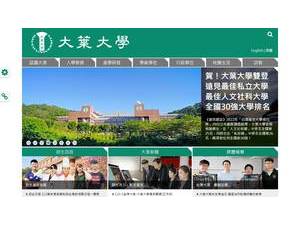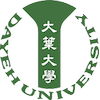
Overview
Established in 1990, the Da-Yeh University is a non-profit private higher education institution located in the suburban setting of the large town of Dacun (population range of 10,000-49,999 inhabitants), Changhua County. Officially recognized by the Ministry of Education of Taiwan, Da-Yeh University (DYU) is a large-sized (uniRank enrollment range: 10,000-14,999 students) coeducational Taiwanese higher education institution. Da-Yeh University (DYU) offers courses and programs leading to officially recognized higher education degrees such as bachelor's degrees, master's degrees and doctorate degrees in several areas of study. See the uniRank degree levels and areas of study table below for further details. This 34-year-old Taiwanese higher-education institution has a selective admission policy based on entrance examinations and students' past academic records and grades. The acceptance rate range is 80-89% making this Taiwanese higher education organization a least selective institution. International applicants are eligible to apply for enrollment. DYU also provides several academic and non-academic facilities and services to students including a library, housing, sports facilities, financial aids and/or scholarships, study abroad and exchange programs, as well as administrative services.
University Snapshot
Control
![]() private
private
Entity
![]() non-profit
non-profit
Size
![]() large-sized
large-sized
Selectivity
![]() least selective
least selective
University Identity
| Name (Non Latin) | 大葉大學 |
|---|---|
| Name | Da-Yeh University |
| Acronym | DYU |
| Founded | 1990 |
| Motto | Using the hands and mind together; dedicated and gregarious |
| Screenshot |

|
| Video Presentation |
n.a.; please submit an official 大葉大學 general video presentation. |
Search Engine
Our search engine is powered by Google.
Location
| Address | No. 168, University Road Dacun 51591 Changhua County Taiwan |
|---|---|
| +886 (4) 851 1888 | |
| +886 (4) 851 1007 |





Social Media
Introduction
Social media can be a powerful tool for Universities to communicate with current students, alumni, faculty, staff and the wider community. But how can social media be important for prospective students? Read our article about the importance of Social Media for universities and prospective students to learn more.
Social Media
uniRank publishes brief reviews, rankings and metrics of some 大葉大學's social media channels as a starting point for comparison and an additional selection tool for potential applicants.
n.a.
n.a.
n.a.
n.a.
大葉大學's main LinkedIn profile
n.a.